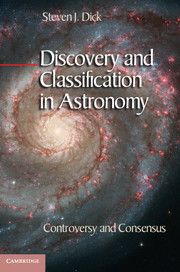Book contents
- Frontmatter
- Contents
- Preface
- Abbreviations
- Introduction The Natural History of the Heavens and the Natural History of Discovery
- Part I Entrée
- Part II Narratives of Discovery
- Part III Patterns of Discovery
- Part IV Drivers of Discovery
- Part V The Synthesis of Discovery
- Appendix 1 Astronomy’s Three Kingdoms
- Appendix 2 Astronomical Discoveries and Their Extended Structure
- Notes
- Select Bibliographical Essay
- Glossary of Concepts Related to Discovery
- Index
Introduction - The Natural History of the Heavens and the Natural History of Discovery
Published online by Cambridge University Press: 05 August 2013
- Frontmatter
- Contents
- Preface
- Abbreviations
- Introduction The Natural History of the Heavens and the Natural History of Discovery
- Part I Entrée
- Part II Narratives of Discovery
- Part III Patterns of Discovery
- Part IV Drivers of Discovery
- Part V The Synthesis of Discovery
- Appendix 1 Astronomy’s Three Kingdoms
- Appendix 2 Astronomical Discoveries and Their Extended Structure
- Notes
- Select Bibliographical Essay
- Glossary of Concepts Related to Discovery
- Index
Summary
On August 24, 2006, the International Astronomical Union (IAU) – the only institution that counts when it comes to official designations of astronomical bodies – declared that Pluto was not a planet. More specifically, astronomers demoted Pluto from a planet to a dwarf planet, and (to the chagrin of many scientists and the confusion of the general public) declared that a dwarf planet was not a planet all, thus reducing the number of classical planets in the solar system to eight for the first time since 1930 when Pluto was discovered. Pluto’s demotion not only meant a rewriting of the textbooks, but also set off a surprisingly intense scientific and public outcry – an interesting cultural phenomenon indicating not only the importance of classification to scientists, but also a deeper investment in astronomy among the general public than one might have thought.
As a longtime member of the IAU, I was among those voting on that fateful day in Prague. Although I had attended every triennial IAU General Assembly since 1988, many of them as an officer in its History of Astronomy Commission, I had never seen the meeting dominated by a single issue as it was on this occasion. Though literally hundreds of sessions were held over the two weeks of the meeting, discussing a broad panoply of astronomical subjects, and though numerous other resolutions were considered and passed at this General Assembly, the resolutions involving Pluto were the center of attention, the subject of numerous sessions, and the topic of the buzz in the hallways. As was tradition, the resolutions were voted on during the last day of the General Assembly, after much discussion the previous two weeks, leaving only 424 delegates to vote out of the thousands who had attended.
- Type
- Chapter
- Information
- Discovery and Classification in AstronomyControversy and Consensus, pp. 1 - 6Publisher: Cambridge University PressPrint publication year: 2013



